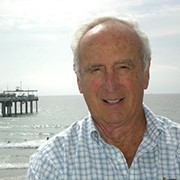
William Newman
Emeritus Marine Biologist
William (Bill) Newman, a marine biologist and renowned authority on seafloor invertebrates at Scripps Institution of Oceanography at UC San Diego, died Dec. 26, 2020 at his home in La Jolla, Calif. He was 93.
Newman’s research touched on many areas of marine biology including analyses of episodic outbreaks of crown-of-thorns seastars in the western Pacific. His renown, however, was in the field of cirripedology, the study of barnacles. In the words of one colleague, his “work on the biology, distribution, evolution, phylogeny, and biogeography of barnacles is the greatest contribution of any scientist since Charles Darwin.”
According to wife Lynn, who herself has a barnacle species named after her, her husband’s fascination began when as a graduate student, he ordered a lobster at Spenger’s Fish Grotto in Berkeley, Calif. near where he grew up and found a barnacle clinging to the shell of his entree.
Newman went on to describe 80 new species of barnacles in his career and wrote extensively on their evolutionary history.
“Bill was my predecessor as curator of the Benthic Invertebrate Collection at Scripps Oceanography and I was honored to take over from such a distinguished invertebrate zoologist,” said Scripps marine biologist Greg Rouse. “In his retirement, Bill continued to do research and publish on his beloved barnacles. The Benthic Invertebrate Collection holds over 2,500 lots of barnacles that he deposited there, making it one of the world’s richest collections.”
Newman was born Nov. 13, 1927 in San Francisco and spent his youth fishing and sailing in San Francisco Bay. He served two years in the Army immediately following World War II and received his bachelor’s and master’s degrees and doctorate in zoology from the University of California Berkeley. In 1962, the year Newman received his PhD, he joined Scripps Oceanography as an assistant professor of biological oceanography.
Shortly after his appointment at Scripps Oceanography, Newman moved to Harvard University where he spent two years serving in part as an assistant curator of the university’s marine invertebrate collection. He then returned to Scripps in 1965 and became curator of its Benthic Invertebrate Collection. He became a full professor a decade later.
Newman took part in several of the major expeditions conducted during Scripps Oceanography’s “Golden Age” of exploration in the mid-20th century. In 1969, his expertise in barnacles came to bear during the Carmarsel Expedition to Micronesia, where he had previously taught for a brief period on the island of Truk before joining Scripps. The goal of the expedition was to determine whether landforms in the region such as volcanic islands seemed to sink because of subsidence or because of sea-level rise. The conclusion, drawn in part from data gathered on fossil barnacles, was that it was a complicated mix of both factors.
Newman and colleague Robert Hessler were selected to present their research to Emperor Hirohito of Japan when the emperor visited Scripps Oceanography in 1975. The pair’s research interests matched that of the emperor, himself an amateur marine biologist who specialized in a class of marine invertebrates called hydrozoans.
Newman retired in 2006, becoming an emeritus professor who remained active in research, publishing regularly on barnacles in scientific journals through 2020.
“Bill was one of the last working survivors of the Golden Age of Zoology,” said Newman’s longtime friend, Scripps Oceanography marine biologist Nicholas Holland. “I have never recognized very many heroes – and now, one fewer.”
Newman is survived by wife Lynn of La Jolla, Calif., sister Barbara Newman Witter of San Francisco, sons William Newman of Atascadero, Calif., James Newman of Pacific Grove, Calif., daughter Doris Newman Horton of Kirkwood, Mo., son Eric Newman of Viroqua, Wisc., stepson Scott Kennedy of Lake Arrowhead, Calif., and 12 grandchildren.
Pradeep K. Khosla
Chancellor
Margaret S. Leinen
Vice Chancellor for Marine Sciences, Director of Scripps Institution of Oceanography
Linda Holland
Emeritus Research Biologist
